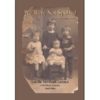On this blog, I have frequently offered excerpts of my mother’s memoir, We Were Not Spoiled. It has been such a satisfaction for me to have written her story and to have been able to hand her a copy. One day, after I had presented her with the hard copy of We Were Not Spoiled, she said to me as she held the book, “You spoil me!”
My mother passed on May 5, 2015, of congestive heart failure. She had said she was not afraid of dying, but she didn’t want to die alone. She did not die alone. Her six kids were with her along with four other members of the family. It was a quiet passing; she slipped away, her breath less and less strong until there was no more breath. It was 9:57 PM.
Below, I am reprinting the eulogy I composed and read at her funeral Mass. (There were also three other eulogies—we were not going to let her go without being sure everyone knew what a terrific woman had just left us.)
At the end of this post, I have a gift for you in memory of my mother.
—
My mother Lucille lived a long life. She was born in 1921 towards the beginning of the 20th century and she died almost a century later.
During her 93—almost 94—years, much changed. There is the obvious: she was born when radio was still in its infancy, the telephone was expensive and cumbersome to use. Automobiles were clunky.
Television was introduced and perfected. Computers came into use. Following the computer came all the rest that she never used.
These technological changes are obvious but at some level they were not the biggest changes that occurred in her lifetime. The big changes had to do with how people lived their lives with one another, how they related to one another.
In her adolescence, like all the young people she knew, she worked—mostly in retailing—and turned her paychecks over to her parents. My mother kept a little 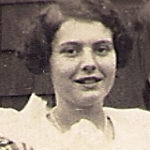 something every week as an allowance. If she required more, she would have to go to her mother and ask for more money to cover her need. This was money that she had earned but she did not question it was her obligation to turn her paycheck over to her parents.
something every week as an allowance. If she required more, she would have to go to her mother and ask for more money to cover her need. This was money that she had earned but she did not question it was her obligation to turn her paycheck over to her parents.
In her lifetime, she saw the affluence of the general population rise. She saw the end of the Lewiston [Maine] mill economy that had dominated her younger life. She saw how people—her children and nephews and nieces—were accessing a higher level of education than she had ever thought accessible to them. She saw changes happen that she could not have imagined when she was young.
Of course, all of these changes, and many more, occurred over a long period of time and, like the lobster dropped into cold water, she experienced the changes gradually, adapting—or not adapting as the case may be—to the demands of each step.
My mother was a stoic. “You do what you have to do!” That seemed to be her motto. My mother was not a person given to introspection, to reflection. Instead, she adapted pragmatically to demands of the present.
As a wartime bride, she saw her husband leave for duty in the Pacific. She had her first child when he was thousands of miles away—all the while living with her in-laws. It was 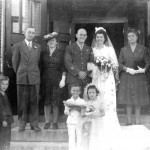 not until Bill was six months old that she would be able to be a family with her son and husband—and even then they would continue to live with her Ledoux in-laws. Living with parents was an accepted way in the 1940s for young couples to start out. The concept of “privacy” did not seem to have much currency.
not until Bill was six months old that she would be able to be a family with her son and husband—and even then they would continue to live with her Ledoux in-laws. Living with parents was an accepted way in the 1940s for young couples to start out. The concept of “privacy” did not seem to have much currency.
In the years that followed came five other children and a variety of homes and work. There was the variety store next to her in-laws. There was work in the textile mills until, not feeling well one day, she came home unexpectedly and found my brother and myself locked out of the house and discovered Claire still in her crib with dirty diapers. She had also found a very surprised babysitter and her boyfriend hanging out in the living room. When my mother could not find another babysitter, she followed what was her deepest commitment and that was to quit work and stay home with her children.
In the 50s, there was the poultry farm in Lisbon Falls. Early one morning in 1954, all of their poultry was shipped out for slaughter and processing. Unfortunately, it was the same morning President Eisenhower suffered a heart attack. The markets crashed. The price of meat dropped dramatically in those few hours after the chickens had been slaughtered. The meat needed to be “moved on” to distributors at a reduced price. What a difference a day sooner—or a day later—would have made in my mother’s life! It was a very bitter time for my young mother. She went to bed that night knowing she and my father were deeply in debt.
Then one day a letter came with the actual sales figures—the “damage” as we say today. 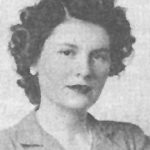 She cried bitterly that day as she read the statement. Claire, too young to be in school, was with our mother when the mail came in and she kept asking, “What’s the matter, mama?” as she tried to console our mother who was so uncharacteristically out of control.
She cried bitterly that day as she read the statement. Claire, too young to be in school, was with our mother when the mail came in and she kept asking, “What’s the matter, mama?” as she tried to console our mother who was so uncharacteristically out of control.
Many years later, when I was an adult, she showed me the letter that Uncle Lucien who was a priest and the educated one in our family had written to her at the urging, I believe, of our grandmother Ledoux who lived upstairs.
In the letter, Uncle Lucien reminded her that, in addition to the money that she and our father had lost, she could lose her children to the depression she was slipping into.
In showing me that letter, my mother said, “I knew I had to leave that behind me. I had to focus on what was really important.” But it took many years before the financial consequences of Eisenhower’s heart attack came to an end in her life.
My mother responded to every stage of her life with a pragmatic approach. When she became a widow at 59, she reinvented her life—and it was a good life she created for herself. There were her many friends—in the widows and widowers group, in the Daughters of Isabella—there were her Lucille days when she would indulge in whatever fancied her, there was renovating her home to better suit herself as a single woman.
Years later, in her late 80s, when it came time to stop driving, she told us that she would make that decision on her own. My siblings and I understood—admittedly with some nervousness—that my mother would not drive beyond her ability to be safe—for herself and for others. One day, she let us know that she would not drive anymore. She asked our brother-in-law John to sell her car. This process was so much Lucille.
When it was time also for her to move out of her apartment, she accepted that as what the present demanded of her. While she was at D’Youville Assisted Living Pavillion, there was no deep struggle or longing for another life in another place.
For my mother’s example of how she grew old, how she accepted the inevitable, we can all be grateful. She has shown us an effective model of how to live our lives.
And now our lives without her have begun. Let these lives be good lives.
As she would say, life is for the living.
—
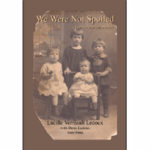
The memoir of my mother, Lucille Verreault Ledoux, We Were Not Spoiled is available in the bookstore. I hope you enjoy meeting this dear woman who was my mother.

 at the end of his first year, on June 1, 1942, that he and my mother married at the Middle Street Baptist Church on Haymarket Square in Portsmouth.
at the end of his first year, on June 1, 1942, that he and my mother married at the Middle Street Baptist Church on Haymarket Square in Portsmouth. After having served small, basically working class churches in Norway and Millinocket, Maine, coming to the Hadwen Park Congregational Church, must have seemed a step up—a promotion of sorts. The congregation would have been more mixed socially and educationally than that of his previous churches.
After having served small, basically working class churches in Norway and Millinocket, Maine, coming to the Hadwen Park Congregational Church, must have seemed a step up—a promotion of sorts. The congregation would have been more mixed socially and educationally than that of his previous churches.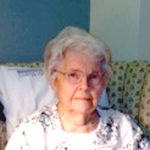

 something every week as an allowance. If she required more, she would have to go to her mother and ask for more money to cover her need. This was money that she had earned but she did not question it was her obligation to turn her paycheck over to her parents.
something every week as an allowance. If she required more, she would have to go to her mother and ask for more money to cover her need. This was money that she had earned but she did not question it was her obligation to turn her paycheck over to her parents. not until Bill was six months old that she would be able to be a family with her son and husband—and even then they would continue to live with her Ledoux in-laws. Living with parents was an accepted way in the 1940s for young couples to start out. The concept of “privacy” did not seem to have much currency.
not until Bill was six months old that she would be able to be a family with her son and husband—and even then they would continue to live with her Ledoux in-laws. Living with parents was an accepted way in the 1940s for young couples to start out. The concept of “privacy” did not seem to have much currency.


